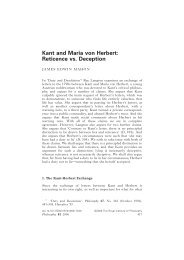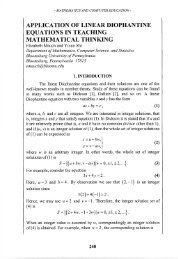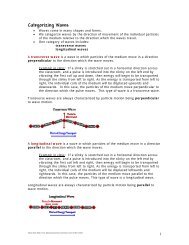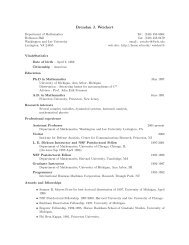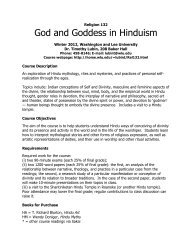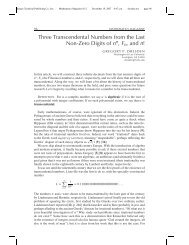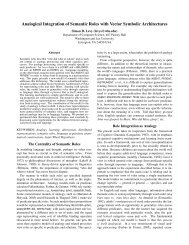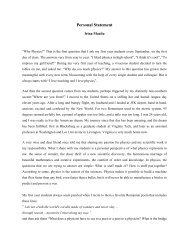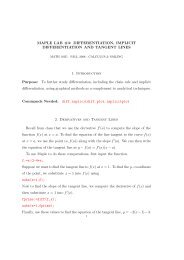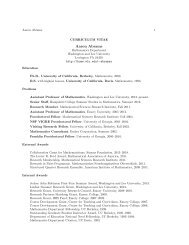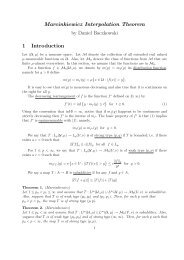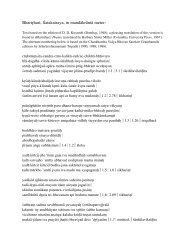comparative assessment of decentralization in africa: ethiopia desk ...
comparative assessment of decentralization in africa: ethiopia desk ...
comparative assessment of decentralization in africa: ethiopia desk ...
- No tags were found...
Create successful ePaper yourself
Turn your PDF publications into a flip-book with our unique Google optimized e-Paper software.
The above evidence results from the <strong>decentralization</strong> drive at lower levels, which enabled theestablishment <strong>of</strong> organizations such as public organization/mobilization <strong>of</strong>fices at woreda leveland the structures <strong>of</strong> kebeles and sub-kebeles. However, caution is aga<strong>in</strong> merited with regard tothe active participation <strong>of</strong> civil society, with Tesfaye (2007, p. 141) not<strong>in</strong>g more reservationsabout the function<strong>in</strong>g <strong>of</strong> the KETB, call<strong>in</strong>g them ―more <strong>of</strong> a failure than a success‖ and not<strong>in</strong>gthey are characterized more by ―excessive control than empowerment.‖Despite the contradictory evidence and conflict<strong>in</strong>g approaches to the question <strong>of</strong> civil society <strong>in</strong>Ethiopia, we may conclude that civil society <strong>in</strong>volvement <strong>in</strong> <strong>decentralization</strong> cont<strong>in</strong>ues to be aweak l<strong>in</strong>k, as noted <strong>in</strong> this section and above <strong>in</strong> Section 2.3 on ―social accountability.‖ Civic<strong>in</strong>stitutions <strong>in</strong> the country are fragmented, with weak coord<strong>in</strong>ation towards jo<strong>in</strong>t goals. They lackmanagerial capacity and experienced and flexible leadership (Dessalegn, 2002). There istherefore a need for <strong>in</strong>dividual organizations to engage <strong>in</strong> debate, to forge common agendas, andto work towards enlarg<strong>in</strong>g the political space. Government efforts to build capacity <strong>in</strong> civilsociety (through the National Capacity Build<strong>in</strong>g Program) could be a useful entry po<strong>in</strong>t <strong>in</strong> thisregard, on the condition that stakeholders facilitate substantive debate and critiques rather thanre<strong>in</strong>forcement <strong>of</strong> exist<strong>in</strong>g political channels.Media and the PressThe situation surround<strong>in</strong>g media and the press <strong>in</strong> Ethiopia is tenuous. Aga<strong>in</strong>, the differencebetween de jure and de facto rules becomes significant. Accord<strong>in</strong>g to legal frameworks, access to<strong>in</strong>formation is relatively open. Freedom House (2010) notes that recent laws nom<strong>in</strong>ally preventgovernment censorship, for <strong>in</strong>stance. However, the reality is more worrisome: the proclamationon press freedom also leaves loopholes that allow the government to restrict report<strong>in</strong>g that maycompromise national security or defame the government. In a dom<strong>in</strong>ant-party system, thisconstitutes a substantial exception that can result <strong>in</strong> considerable self-censorship.The press situation is complicated by the predom<strong>in</strong>ance <strong>of</strong> government-run and party-affiliatedmedia sources (cf. International Research and Exchanges Board [IREX], 2008). While<strong>in</strong>dependent news sources are permitted, economic realities prevent the emergence <strong>of</strong> substantialcompetitors; this is true both <strong>in</strong> pr<strong>in</strong>t and broadcast media (with the latter largely restricted toradio). Internet access is largely unrestricted, but available only to the few. There is access t<strong>of</strong>oreign sources <strong>of</strong> <strong>in</strong>formation onl<strong>in</strong>e, with the important exception alleged by some journaliststhat certa<strong>in</strong> opposition websites hosted abroad may be blocked. With regard to television, thestate-sponsored channel dom<strong>in</strong>ates and private Ethiopian television is essentially non-existent;<strong>in</strong>ternational transmissions are available, but can be accessed by relatively small numbers <strong>of</strong>people, typically <strong>in</strong> the largest cities. The Media Susta<strong>in</strong>ability Index scores Ethiopia a 1.35 on ascale <strong>of</strong> 0 (worst) to 4 (best), characteriz<strong>in</strong>g Ethiopia as an ―Unsusta<strong>in</strong>able Mixed System‖—neither entirely anti-free press, nor near<strong>in</strong>g a susta<strong>in</strong>ably free press (IREX, 2008).3.3.4. THE DONOR ARENARelations between the Ethiopian government and the donor community have been stra<strong>in</strong>ed onquestions <strong>of</strong> governance, despite considerable <strong>in</strong>teractions between donors and the Ethiopiangovernment, and despite Ethiopia’s reputation as a favored country for donors throughout much<strong>of</strong> the period s<strong>in</strong>ce the fall <strong>of</strong> the Derg. On governance issues, the central government has beencritical <strong>of</strong> <strong>in</strong>ternational efforts to modify or reshape patterns <strong>of</strong> authority <strong>in</strong> the countryETHIOPIA DESK STUDY 25



